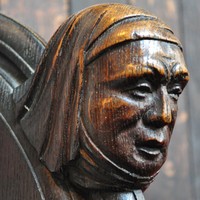Papers by Nicole Coonradt
Religion and The Arts, 2010
Religion and the Arts, 2013
George Eliot - George Henry Lewes Studies
Religion and the Arts, 2007
Considering the notion of poetry in Early Modern drama as a veil for political commentary during ... more Considering the notion of poetry in Early Modern drama as a veil for political commentary during a perilously censorious time, this essay closely examines Shakespeare's The Merchant of Venice in its previously ignored historical context while providing a brief survey of the play's critical heritage to show how the…

Religion and the Arts, 2021
This essay considers Shakespeare through Aristotelianism and Thomism to explore Hamlet as a medit... more This essay considers Shakespeare through Aristotelianism and Thomism to explore Hamlet as a meditation on tyranny. Based on the classical model of tragedy as presented by Aristotle in his Poetics and further informed by his Ethics and Politics, the essay identifies the climax of the play in order to determine the playwright’s argument about what should have happened instead of what did—namely, the hero should have removed the tyrant Claudius when given the opportunity at Act 3, Scene 3. Shakespeare is deliberately and successfully upending the Aristotelian model, while yet fulfilling its definitions and expectations. The claim is further supported by Aquinas’s six conditions for the right use of anger and vengeance as found in his Summa Theologica. Hamlet’s choice not to act is highly significant—and ironically Shakespearean. The play’s treatment of tyranny may have been a call to action for Shakespeare’s contemporary audience.

This study explores the English Catholic artistic response to reforms—reforms being both internal... more This study explores the English Catholic artistic response to reforms—reforms being both internal and external to the Catholic Church—as part of the Catholic Reformation. “Response,” for the purposes of this project, may be defined in terms of an “answer” in an ongoing dialogue about the Catholic position and may be seen as both conciliatory and apologetic in nature. Understanding this response is useful when we consider the role of rhetoric and poetry in society and the attendant contemporary theories thereof, in their historical context, especially the duty of the poet. The recent “revisionist” history is central to understanding art contextually. While identifying the key doctrinal debates between Catholics and Protestants, this study traces these elements in the English Catholic art of Edmund Campion, Robert Southwell, and William Byrd and focuses, especially, on the way art attempts to reconcile man’s human and divine natures, or Eros and Agape. This can enrich our understandin...

Saint Joan (1923), considered by many to be Shaw’s masterpiece—indeed Thomas Mann called it ‘‘the... more Saint Joan (1923), considered by many to be Shaw’s masterpiece—indeed Thomas Mann called it ‘‘the most fervent thing Shaw ever wrote’’— continues to challenge readers, a challenge that often yields intricate new meanings.1 The subtitle, A Chronicle Play in Six Scenes and an Epilogue, offers little to clarify our generic expectations, especially when Shaw’s traditionally lengthy preface begins with a section (one of forty-one!) titled ‘‘Joan the Original and Presumptuous.’’ This declaration of ‘‘presumption’’ courts further scrutiny, especially as it becomes a focus in the play and underscores Shaw’s ironic craft. Shaw writes, ‘‘[Joan] went to the stake without a stain on her character except the overweening presumption, the superbity as they called it, that led her thither’’ (7). What I propose to explore is how Shaw takes the reader’s presumptions and exploits them in order to effect his satire or antitragedy by crafting his own romantic vision of Joan in the hope of rescuing what ...
Shaw the Annual of Bernard Shaw Studies, 2009
... Nicole Coonradt Nicole Coonradt is a Ph.D. candidate and teaching fellow at the University of... more ... Nicole Coonradt Nicole Coonradt is a Ph.D. candidate and teaching fellow at the University of Denver. ... 2. Jean Michelet, Joan of Arc: or The Maid of Orleans, in History of France (New York: Stanford & Delisser, 1858). 3. Wood, "Introduction" to Bernard Shaw, Saint Joan, p. xx. ...
Religion and the Arts, 2007
Religion and the Arts, 2007
Mini-Epic Poetry: Agency and Free-Will—“Children of an Idle Brain” and “Frog of Good Fortune," in 9 Muses News: New Trends in Art, Business, and Science. Ed. Keri Douglas. 13 Jan. 2018. https://9musesnews.com/ , 2018
Creative Writing-- Blank Verse
Mini-Epic Poetry: Agency and Free-Will—“Children of an Idle Brain” and “Frog of Good Fortune," in 9 Muses News: New Trends in Art, Business, and Science. Ed. Keri Douglas. 13 Jan. 2018. https://9musesnews.com/ , 2018
Creative Writing: Mini Greek Epic/Tragedy

_The Renaissance Bulletin_ 39 (2013): 43-63., 2013
The Argument: In the days after the flood, but before the coming of Christ, there was a man who d... more The Argument: In the days after the flood, but before the coming of Christ, there was a man who dwelt in Babylon, called by the name of Joakim. When his time came to marry, he wed a God-fearing maiden named Susanna, daughter of Helcias. Not only was Susanna noted for her rare beauty, but, as her just parents had instructed and raised her according to the law of Moses, she was also remarkable for her faith. Now Joakim, being a man of wealth, maintained a garden near his house. As he was also reputedly wise, the Jews resorted to him and deemed him the most honorable of them all. By way of the custom, two of the elders from among the people were appointed judges the year in which this story takes place. But of these two, the Lord said: 'Iniquity came out of Babylon from the ancient judges that seemed to govern the people.' This, then, is a story of iniquity, and how God sent a boy, Daniel, to judge the unjust who would destroy the chaste and faithful Pearl of Babylon and defile the sacred temple, deceiving and leading astray the people, with their lust and lies.
Cantaraville , 2007
Dissident Theory as a Methodology

Religion and the Arts, 2007
Considering the notion of poetry in Early Modern drama as a veil for political commentary during ... more Considering the notion of poetry in Early Modern drama as a veil for political commentary during a perilously censorious time, this essay closely examines Shakespeare's Th e Merchant of Venice in its previously ignored historical context while providing a brief survey of the play's critical heritage to show how the play's anti-Judaism effects reader response. Within an emerging new vein of Dissident Th eory that explores formerly overlooked historical facts in Eng-land's troubled Reformation history, this essay provides an alternate interpretation reading "otherwise" to discover how Shylock haunts our interpretations of the play, which is not, as this essay's title suggests, so much about the Jewish Question, but the Christian one as found in the Catholic-Protestant crisis, as crisis it undoubtedly was. Th is reading offers a measured departure from most existing scholarship by exploring the play poststructurally as the site of a metaphoric, performative conversion where Shakespeare employs the trope of anti-Semitism ironically to convey a coded message about the moral incoherence in popular Christianity-specifically concerning aroused anxieties about Christian identity as seen in forced conversions and the complete violation of the basic tenets of mercy and justice which highlight the hypocrisy in Christianity as Shakespeare saw it practiced.
George Eliot - George Henry Lewes Studies, No. 62/63 (September 2012), pp. 16-33, 2012
JSTOR is a not-for-profit service that helps scholars, researchers, and students discover, use, a... more JSTOR is a not-for-profit service that helps scholars, researchers, and students discover, use, and build upon a wide range of content in a trusted digital archive. We use information technology and tools to increase productivity and facilitate new forms of scholarship. For more information about JSTOR, please contact support@jstor.org.
Religion and The Arts, 2008
Book Review of:
Lupton, Julia Reinhard. _Citizen-Saints: Shakespeare and Political Theology_.
Ch... more Book Review of:
Lupton, Julia Reinhard. _Citizen-Saints: Shakespeare and Political Theology_.
Chicago IL: University of Chicago Press, 2005. Pp. xii + 277. $35.00
cloth.










Uploads
Papers by Nicole Coonradt
Lupton, Julia Reinhard. _Citizen-Saints: Shakespeare and Political Theology_.
Chicago IL: University of Chicago Press, 2005. Pp. xii + 277. $35.00
cloth.
Lupton, Julia Reinhard. _Citizen-Saints: Shakespeare and Political Theology_.
Chicago IL: University of Chicago Press, 2005. Pp. xii + 277. $35.00
cloth.
Betteridge, Tom. _Literature and Politics in the English Reformation_. Politics,
Culture and Society in Early Modern Britain Series, eds. Ann Hughes et al.
Manchester, England and New York: Manchester University Press and Palgrave
Macmillan, 2004. Pp. viii + 253. $74.95 cloth.
Marotti, Arthur F. _Religious Ideology and Cultural Fantasy: Catholic and Anti-
Catholic Discourses in Early Modern England_. Notre Dame IN: University
of Notre Dame Press, 2005. Pp. xii + 308 + 6 illustrations. $55.00 cloth,
$25.00 paper.
_Fighting the Antichrist: A Cultural History of Anti-
Catholicism in Tudor England_. (Original Spanish 2006). Trans. Bradley L.
Drew. Brighton: Sussex, 20U. Pp. vii -t- 226 + 4 illustrations. $69.95 cloth
“‘And Art Made Tongue-Tied By Authority’: Shakespeare as Dissident Sonneteer. (Rhetoric and
Emblem in Sonnet 66)” (Presentation) Panel: “Memory of a Lost Religion.” Moderator:
R.V. Young. South Atlantic MLA Conference. Durham, NC. 9-11 Nov. 2012.
“‘Counter, Original, Spare, Strange’: Hopkins’ Poetic Apologetics in ‘Pied Beauty’—Early
Modern Aesthetic Influences.” (Presentation) Society for Early Modern Catholic Studies.
87th South Atlantic MLA Conference. Durham, NC. 13-15 Nov. 2015.